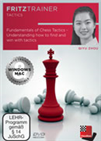How many colours?
A young boy was playing chess against his father. The kid just learned the rules and the father was a very good player, so of course the boy lost all his games against him. The father didn’t want to lose on purpose and encourage some false hope for his son.
One day, the father asked his son if he wanted to play another game of chess against him. But the child said he didn’t want to play with him because he would lose anyway. This answer left the father a bit sad. He didn't want his son to feel bad about chess. It is such a nice game, after all.
The father thought for a moment and said: “How about I give you a riddle instead? If you can solve it, I will count it as a win against me”.
This idea didn’t fail and caught the son’s interest, so he went to his father. When the boy arrived, he saw that the chessboard was set up with nothing else but a king.
 What’s the easiest way to win a chess game? We all know finding a good tactic in a game can let you win a point immediately. Therefore, Fundamentals of Tactics is an excellent choice for you if you wish to learn how to start finding tactics in your games!
What’s the easiest way to win a chess game? We all know finding a good tactic in a game can let you win a point immediately. Therefore, Fundamentals of Tactics is an excellent choice for you if you wish to learn how to start finding tactics in your games!
“Listen carefully”, the father started, “if you colour all the squares of the chessboard so that the king enters a different-coloured square in each move, how many different colours do you need?”
The son thought about the riddle for a while. After a couple of hours, he ran to his father to tell him the correct answer. Now it is your turn:
How many different colours are needed?
Note that the very first thought might be that we only need black and white square. But keep in mind: the king can reach a lot of different squares in each move!
I hope that there are people out there who haven’t heard of this puzzle before.
It would be interesting to know how much time you needed to solve the riddle. It varied a lot while testing!
In this philosophical puzzle, practically everyone who wrote a comment to the solution got it right! Well done and thank you once again for your interest, analysis and thoughts.
Nonetheless, here is the intentional solution:
Fritz knows about both paper rolls, so he will “eat” one of them. The other paper roll will show the word “black”, leading to the conclusion that the paper roll he ate read “white”.
Houdini knows that Fritz knows about the paper rolls, so he will change both rolls to read “white” instead of “black”.
Fritz knows that Houdini knows that Fritz knows about the paper rolls. So Fritz won’t eat one of the paper rolls, but instead take it, read it, play with white and win the tournament.
The end.
The riddle was very philosophical, because this back and forth game could have continued forever, leading to a 50/50 situation for both players. Since an intentional manipulating plan was involved, the outcome leaves space for more speculation. How well do the chess players know each other? What if Fritz never knew about the plan in the first place? If he never knew about the plan, would he have eaten one of the paper rolls?
Links:























